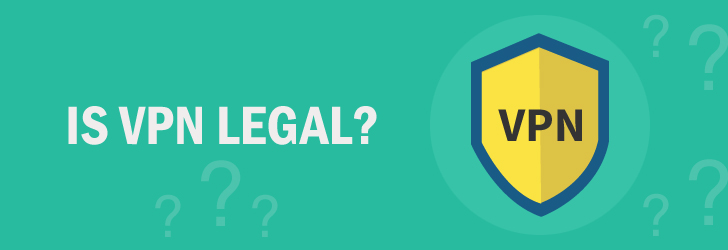
There is always a general debate around the usage of VPN whether it is legal or illegal to use. As most of us know, VPNs enhance security and come with certain undeniable benefits. Using VPN in most countries is legal, but certain countries ban VPN entirely or partially, depending on the purpose of its use.
VPN provides following benefits
- Enhances security by providing encryption
- Hide your IP Address and offer online anonymity
- Unblocks websites and bypasses filters
- Changes IP address while being online. Leaving you untraceable
- Provides better file sharing capabilities
- Supports remote connectivity
If there are so many benefits of using VPN, why do some countries choose to ban VPN?
Though VPN can provide enhanced security and protect users from identity theft, they can also be used for carrying out illegal activities. Traffic on a VPN is not traceable, and in most cases, VPN vendors do not maintain logs that can be traced.
These features of VPN are used by several scamsters and hackers to their advantage. This lets them to carry out illegal activities that can remain untraceable and undetected. Countries with more stringent censorship due to certain socio-economic or political conditions sometimes choose to use VPNs as a means to circumvent these restrictions.
Illegal use of VPN
VPN is used by hackers, cybercriminals, and terrorist groups to perform unlawful online activities. Since these are untraceable, they put themselves at least at risk. Few of the illegal usage of VPN are:
- Hacking: Hackers use VPN to hide their identity and gain unauthorized access to the network. The intention here is to disrupt services, steal data, or tarnish the organization's or government's reputation.
- Cyberstalking: Online stalkers create a ruckus by stalking users and, at the same time, remain safe by being untraceable.
- Illegal File sharing: Certain files, multi-media content have copyrights associated and are not supposed to be shared or downloaded online. Torrenting is something that most users carry on over a VPN.
- Dark Web: Dark web is a place that is hidden from most online users. A great deal of illicit activities are conducted on the dark web. Illegal activities involving the trade of banned items such as drugs and weapons are done over the dark web using VPN.
- Illegal content: Illegal content, such as pornography, is viewed with a VPN. Again, keeping the activity untraceable.
- Cyber-attacks: Cyber-attacks such as spreading malware, identity theft, and catfishing is carried out using VPN.
The above reasons make the use of VPN illegal in certain countries.
Countries where VPN is illegal
Countries such as the USA, UK, Canada, and most countries allow VPN, and it's legal. However, there are a few countries where VPN is banned and illegal.
Few of these countries are:
- China: VPN is considered illegal in China. While this is illegal, it isn't completely banned. Few VPN providers can still operate after obtaining a relevant government license. The VPN provider must comply with the laws of the country and accept government terms and conditions to share relevant data when required.
This is proactively done to maintain adequate content and internet usage censorship. - Turkey: Social media usage in Turkey is restricted or banned. Along with social media websites, the government has also banned VPN services. This makes the usage of VPN illegal in Turkey and requires usage of only government approved VPN service providers .
- Iraq: Iraq, which is under constant stress owing to its political conditions and constant threats from unlawful groups, had no choice but to make VPN usage illegal. This, however, has put the ban around complete Iraq on VPN usage.
- Russia: To prohibit accessing certain websites, the government of Russia made the use of VPN illegal in certain cases. Legitimate usage of VPNs is still permitted. Accessing banned content via VPN is considered illegal. While this is not completely illegal, the use of VPN is still controversial around this region.
- UAE: In the UAE, VPN is banned and can result in heavy fines. Unlike other countries, the primary intention of banning VPNs in the UAE is to reduce the use of VOIP services. Since this will impact the existing telecommunications market. Owing to this reason, the UAE considers the use of VPN illegal.
- Turkmenistan: VPN is completely banned. The country has only one ISP and that belongs to the government. This is a step taken to impose censorship on foreign media.
- Iran: Iran does not completely make the usage of VPN illegal. However, users can only use VPNs from government-licensed providers. This is similar to China, where the government imposes restrictions and requires cooperation when needed.
- Oman: Oman has restrictions and censorship for internet usage, social media, and hence also bans VPN.
- Belarus: Belarus banned VPN in 2015, though this is similar to Russia and is not a complete ban. The ISP must continuously check the list of banned service providers published by the government. Using a VPN to bypass geo-restrictions can result in fines.
- North Korea: North Korea imposes several internet restrictions and also bans VPN usage for its locals.
Conclusion
China, Iran, Oman, Russia, Turkey, Belarus, and the UAE have VPN restrictions and are governed by the government. You can only use VPN services from government-licensed providers. Iraq, North Korea, and Turkmenistan completely ban VPN. Based on the political and social situation, these laws are bound to be altered. Though most countries allow VPN as a legal activity, there are a few countries that either fully or partially ban VPN.
Share this post
Leave a comment
All comments are moderated. Spammy and bot submitted comments are deleted. Please submit the comments that are helpful to others, and we'll approve your comments. A comment that includes outbound link will only be approved if the content is relevant to the topic, and has some value to our readers.

Comments (0)
No comment